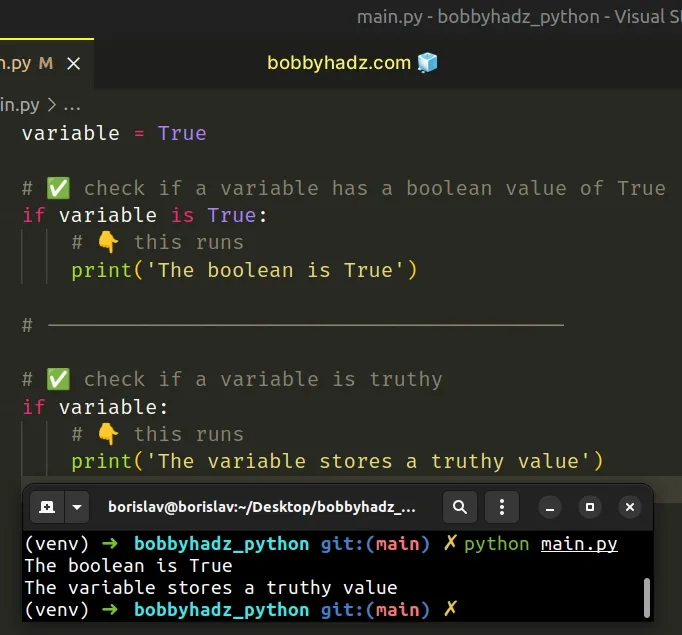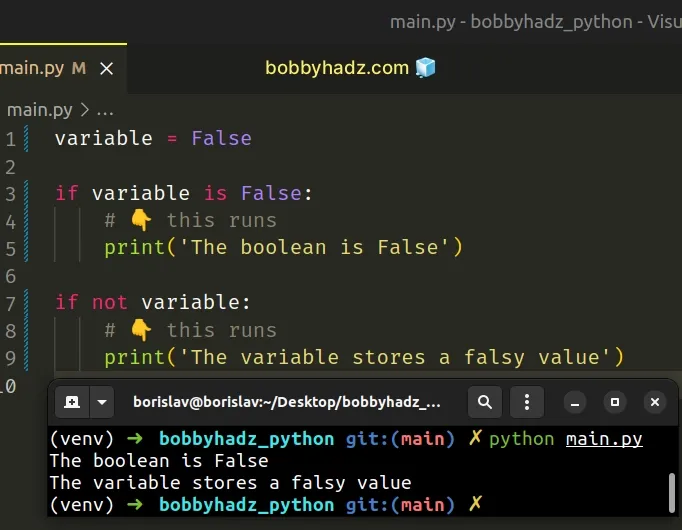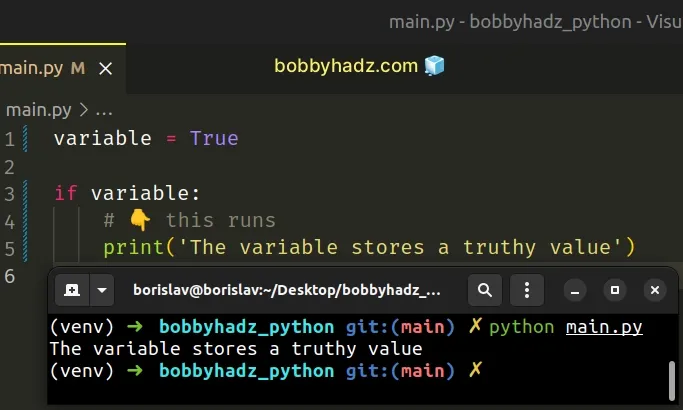Using booleans in an if statement in Python
Last updated: Apr 9, 2024
Reading time·3 min

# Using booleans in an if statement in Python
Use the is operator to check for a boolean value in an if statement, e.g.
if variable is True:.
The is operator will return True if the condition is met and False
otherwise.
variable = True # ✅ check if a variable has a boolean value of True if variable is True: # 👇️ this runs print('The boolean is True') # ------------------------------------------ # ✅ check if a variable is truthy if variable: # 👇️ this runs print('The variable stores a truthy value')

The first example checks if the variable stores a True boolean value.
You should use the is operator when you need to
check if a variable stores a boolean value or None.
Use the equality operators
(equals == and not equals !=) when you need to check if a value is equal to
another value, e.g. 'abc' == 'abc'.
In short, use the is operator with built-in constants like True, False and
None.
# Checking for False or a Falsy value
You can use the same approach when checking for False or a falsy value in an
if statement.
variable = False if variable is False: # 👇️ this runs print('The boolean is False') if not variable: # 👇️ this runs print('The variable stores a falsy value')

True and False is very different than checking for a truthy or falsy value.# Checking for a Truthy Value in an if statement
Here is how we would check for a truthy value in an if statement.
variable = True if variable: # 👇️ this runs print('The variable stores a truthy value')

The falsy values in Python are:
- constants defined to be falsy:
NoneandFalse. 0(zero) of any numeric type- empty sequences and collections:
""(empty string),()(empty tuple),[](empty list),{}(empty dictionary),set()(empty set),range(0)(empty range).
if block runs if any other value is stored in the variable.Here are some examples.
if 'hello': print('this runs ✅') if ['a', 'b']: print('This runs ✅') if '': print('this does NOT run ⛔️') if 0: print('this does NOT run ⛔️')
if not X returns the negation of if X. So with if not X, we check if X
stores a falsy value.
You will often have to use multiple conditions in a single if statement.
You can do that by using the boolean AND or boolean OR operators.
if True and True: print('This runs ✅') if True and False: print('This does NOT run ⛔️') # -------------------------------------- if True or False: print('This runs ✅') if False or False: print('This does NOT run ⛔️')
The first two examples use the
boolean AND operator and the
second two examples use the boolean or operator.
and operator, the expressions on the left and right-hand sides have to be truthy for the if block to run.In other words, both conditions have to be met for the if block to run.
if True and True: print('This runs ✅') if True and False: print('This does NOT run ⛔️')
When using the boolean or operator, either of the conditions has to be met for
the if block to run.
if True or False: print('This runs ✅') if False or False: print('This does NOT run ⛔️')
If the expression on the left or right-hand side evaluates to a truthy value,
the if block runs.
I've also written an article on how to check for multiple conditions in an if statement.
# Additional Resources
You can learn more about the related topics by checking out the following tutorials:
- Styling multiline 'if' statements in Python
- Check if all/any elements in List meet condition in Python
- Using f-string for conditional formatting in Python
- Find the index of Elements that meet a condition in Python
- SyntaxError: invalid syntax in if statement in Python [Fix]
- Get the first item in a list that matches condition - Python
- Remove elements from a List based on a condition in Python

